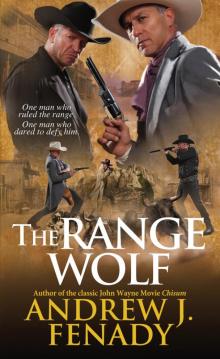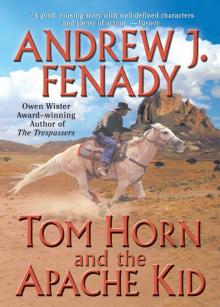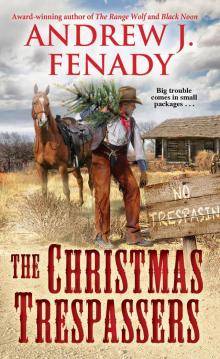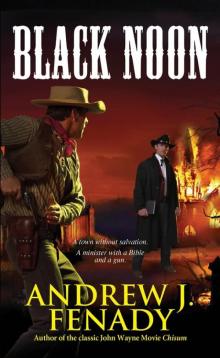- Home
- Andrew J. Fenady
Tom Horn And The Apache Kid Page 9
Tom Horn And The Apache Kid Read online
Page 9
Mandan was first to his feet. He fired toward Horn. Just as the bullet shattered the store window behind him, Horn took aim at the exposed Indian. Horn’s slug tore through Mandan’s throat.
Chukra was on one knee, also in the open. His pistol went off three times before two of Horn’s bullets dropped him.
Geronimo, dazed by the fall and hampered by the chains, crawled on his elbows and knees toward the fallen Winchester. He reached it just as Horn arrived to kick the rifle out of Geronimo’s grasp.
Once again the old warrior looked up into the barrel of Tom Horn’s gun.
A crowd consisting of nearly everyone in the fort converged around Horn and Geronimo.
If General Nelson Appleton Miles looked ridiculous in his white-plumed hat, he looked even more ridiculous without it in his stocking feet, military tunic, and underwear. The sword he held in his hand completed the effect.
They were all there—Sieber, Shana, Crane, Karl Van Zeider, Pete Curtain, Doctor Barnes, Nurse Thatcher, Baldy, and even Peg.
“By heaven!” Miles roared at Horn. “How did this red dev il get out of that guard house?”
“Don’t ask me, General—I’m retired.” Horn pointed to Geronimo. “Ask him. But I don’t think he’ll tell you.”
Doctor Barnes walked over. He had just finished examining Mandan and Chukra.
“Those other two aren’t going to be telling any more lies or having any more breakfasts. Tom, you shoot better by dark than by daylight.”
“Just aimed at the sound of their guns,” said Horn.
“Yeah, well, one of ’em must of had his gun in his throat.” Barnes glanced at Nurse Thatcher, who in her nightgown resembled a fugitive scarecrow. “Come on, Nurse Hatchet. Those poor souls are beyond any harm you can do them.”
“Captain Crane,” Miles commanded, pointing his sword toward Geronimo, “I want this man handcuffed. And make arrangements to have him and the rest of his savages shipped out by Monday.”
“Just a minute, General.” Doctor Barnes had overheard Miles and turned back. “Monday’s only four days from now. Some of those people are sick and wounded. They’re not fit to travel yet.”
“Fit or unfit, every damn one of them is going to be on that train out of here on Monday. Is that clear, Captain?”
“Yes, sir,” Crane responded.
“Good night.” Miles reflexively started to sheath his sword, until he realized that there was no scabbard attached to his underpants. Sword in hand, he headed toward his quarters.
Geronimo’s eyes burned into Horn. He said nothing as Crane and six troopers led him back to the guard house.
“Tom?” Shana Ryan put her hand on Horn’s arm. “Are you all right?”
Horn smiled and nodded.
“Tom, are you coming?” Sieber asked.
“Yeah, I’m coming.”
“Very fortunate, Mr. Horn,” Van Zeider intoned.
“What’s fortunate?”
“Why, the fact that you were near this particular spot so late at night—or early in the morning.” Van Zeider looked with implication from Ryan’s store to Shana to Horn.
The muscles in Horn’s neck tensed, and he started to move a step toward Van Zeider, but Shana’s hand squeezed his arm even tighter.
“Well good-night, everybody.” Van Zeider hooked both thumbs into his vest and walked away.
“I’m gonna get some sleep if it kills me,” said Sieber, and moved in the opposite direction.
“Tom,” Shana whispered, even though the two of them stood alone in the darkness, “you left your hat inside.” She smiled.
“I know,” said Horn. “And my bottle. Gives me an excuse to come by tomorrow.”
Chapter Sixteen
By the first light of sunrise, Horn and Sieber walked toward Sieber’s horse, which was already saddled and ready to ride. Sieber would get to Globe by horse back and take the overnight stage to Prescott. With any luck, he’d be back in Bowie before Monday. Of course, it might take Governor C. Meyer Zulick longer than that to reach a decision in the matter. Governor Zulick was not an impulsive man. He had to be sure of his legal footing before treading a tightrope.
Sieber did his best to work the morning stiffness out of his legs and back. He bent from one side to the other, arched his spine, hinged up one knee then the other. He took hold of the pummel, worked his boot into the loop of the stirrup, and levered his body onto the saddle.
“Well, Al,” Horn said, “use them spurs.”
“I intend to.” Sieber patted the mane of his horse.
“No. I mean on your friend—Lead Ass Zulick.”
“I’ll do what I can, but he’s awful set in his ways. You know how cautious them lawyers are. Say, where’s your hat?”
“Huh? Oh, I…I musta lost it last night.”
“You better go look for it. That’s a good hat. Well, tell the Kid I’ll do what I can. Auf Wiedersehen.”
“Adiós, Al.”
Still hatless, Tom Horn opened the door to the guard house and walked in. Even though Krantz and Dawson were no longer on duty, they were still in the guards’ quarters drinking coffee, along with Sergeant Pat Cahill and trooper Dennis Ward, who had relieved them a few minutes ago.
“Mornin’, Tom,” Krantz greeted, lifting a cup. “Care for some tar? Fresh made.”
“No, thanks.”
“Look, Tom,” Krantz went on, “me and Dawson here didn’t get a chance to thank you last night. We thought it wise to stay outta General Miles’s sight-lines before he started askin’ too many how’s, why’s, and wherefore’s, but you pulled our butts outta the burner. Did Geronimo get away, ol’ Miles mighta had us shot. So…well, thanks.”
“Forget it,” Horn answered.
“Geronimo won’t forget it,” Sergeant Cahill said. “That was his last hurrah. He’s got more iron on him than a kitchen stove.”
“Can I go back there and talk to the Kid?” Horn nodded toward the cellblock.
“You bet,” Cahill smiled, “so long as Dennis here goes back part ways with you. Those Apaches’d sooner peel your hide than anything I can think of.”
“Thanks.” Horn started toward the cellblock.
“Oh, and Tom…” Cahill almost winced. “We had to cuff the Kid, too—orders.”
There was a lethal silence as Horn walked the long corridor bisecting the cellblock. Every cold, black Apache eye followed his every step. Hate hung thick as paste in the stillness.
As Horn passed, Geronimo’s eyes were twin vials of venom. He had been moved three cells toward the guardroom. Two other Apaches had been evicted and transferred into another chamber so Geronimo still possessed private accommodations. He also possessed a set of handcuffs. Rather, they possessed him.
Horn stopped and looked at the dynamited cell a moment, then turned to the Apache Kid, who stood by the iron bars.
“Howdy, Kid.”
For answer the Apache Kid brought up to his chest both fists bound by the iron handcuffs.
“Yeah, I know.” Horn bit his lip. “Look, Kid, Miles is fixing to ship you and…the rest of ’em out of here on Monday. …” Horn stopped and looked into the Kid’s eyes. “You already knew, didn’t you?”
The Kid nodded slightly.
“How did you know? Did the guards tell you?” “No.
I just knew. Remember, I’m an Indian.” “Al’s already on his way to Prescott. We hope to get word before then.”
“Tom, it’s no use. I’ll do what I have to.”
“Now, don’t try anything dumb, Kid.” Horn motioned toward the hold in the opposite cell. “He tried and didn’t get very far.”
“If I did break out, would you come after me, Tom, like you did him?”
“What kind of talk is that? You know better, you know that I—”
“I know,” the Kid answered.
“Ol’ Geronimo had some help,” Horn changed the subject, glanced again at the blown-out cell. “Dynamite, horses, wagon, and Winchesters—white man’s help.”<
br />
The Kid nodded in agreement.
“You’ll have help too, Kid—but a different kind. We’ll do it legal.” Horn pulled a pouch out of his breast pocket. “Here’s tobacco and the makings. I’ll be back.”
“Skookum,” said the Kid, and took the pouch with his manacled hands, then motioned to Horn’s head. “Where’s your hat?”
“Huh? Oh, I musta left it back in the room. Well, see you, Kid.”
Horn turned and without looking in either direction started to walk toward trooper Dennis Ward, who waited halfway up the corridor.
If it began by signal, the signal was unseen and unheard. As Horn took his first step he listened to a low, plaintive wail. It came from the mouth of every penned-up Apache in the guard house except for Geronimo and the Kid. Horn had heard it before—the knell of death, the mysterious but unmistakable dirge to the dead. Tom Horn knew that the litany was for him. But it was not a lamentation; it was a celebration, a chant celebrating the death of an enemy—Tom Horn.
Shana Ryan was dragging a bushel of potatoes when Tom Horn walked into the store.
“Good morning, Tom.”
“Morning. Here, let me do that. Where do you want it?”
“Over there.” Shana pointed to a pile of groceries by the counter. “I’m getting an order ready for the Chandlers.”
“What you ought to get is some help around here.”
“I had some. But after payday he decided to get drunk. Haven’t seen him since,” she smiled.
“Speaking of drink…” Horn cleared his throat. “I want to thank you for what you did last night and to apologize—”
“No apology necessary. You were a perfect gentleman.”
“At one in the morning? With a snootful? It’s a good thing you take in strays.”
“I’m very particular about the ‘strays’ I take in, Mr. Horn. But this fellow said he was looking for a hooty owl, and…”
“Yes, ma’am. I remember. And some of the other things I said, well...”
“You were very nice. I’ve never been called a bird of paradise before. I suppose you’ve come for your whiskey and your hat.”
“Just as soon leave the whiskey here, but I never knew so many people noticed a hat before.”
“Follow me,” Shana said, leading the way toward the apartment. “I thought it best not to bring it out here, just in case some curious customer started asking questions about it.”
“Like that Van Zeider? I didn’t like what he said last night and the way he said it.”
“There’s not much about Karl Van Zeider that you do approve of.” Shana handed Horn his hat.
“Let’s put it this way”—Horn adjusted the hat on his head to its accustomed angle—“if he don’t go to hell, there’s no use having one. Well, thanks.”
Horn extended his hand. Shana fitted her palm into his. Tom’s was a big hand, hard and used to the feel of reins, the curve of a pistol, and the metal and wood of a Winchester—a hand that had dealt death. Still, there were warmth and tenderness to its touch. For an instant Shana felt safe and secure. She had thought about him last night as she lay in her bed—how awkward and almost childlike he seemed, loyal and concerned about his friend the Apache Kid…questioning the inequities of man’s inequities to man. He was shy and considerate— and then the change outside, with a gun in this same hand. He had stood nerveless, defiant in death’s doorway, shooting the horse and, with bullets flying at him, killing two men and kicking the rifle out of Geronimo’s grasp.
He was a changeable man, this Tom Horn, whom she had met only a short time ago—a sudden man. But he had warmth and a tender touch. Reluctantly, she took her hand from his.
“Can I help you with the rest of that order out there?” he asked.
“I’m sure the Chandlers would be very pleased,” Shana smiled, “and I would too.”
“So would I,” Tom Horn said, and gently touched the tips of his fingers to the flesh of her forearm as they walked from the apartment into the store.
Chapter Seventeen
At noon on Monday, a steaming locomotive pointing east, coupled to two cars and a caboose, waited on the tracks near the depot where a large platform festooned with red, white, and blue streamers had been set up for the celebration.
It would be an event to remember, a historical highlight in the short but sanguine saga of the Arizona Territory. Soon Geronimo and the shackled remnants of his brigade, along with the women, wounded, and children of his tribe, would be loaded like cattle and exiled forever from their homeland.
The order went down from General Miles that every trooper would wear a clean uniform and polished buckles, buttons, and boots.
Hundreds of citizens converged from many miles to cast a final look at Geronimo, the scourge of the territory, and to participate in a ceremonial tribute to the territory’s great liberator General Nelson Appleton Miles.
Even throughout this last hour, Doctor Barnes and Nurse Thatcher circulated among the infirm and wounded Apaches who had been herded to the depot. Some of the Indians were too sick or weak to stand. Up to almost the last minute, doctor and nurse changed ban dages and dispensed drugs to the dazed and bewildered Chiricahuas.
A brass band struck up “The Battle Hymn of the Republic” while dozens of white children who had been excused from school that day scampered among the attending adults. Dogs barked at the music, and stray chickens clucked in accompaniment.
A good time was being had by most—not by Tom Horn nor by Al Sieber, who had ridden in less than an hour ago and who showed the effects of his journey. Sieber didn’t wait for a stagecoach to come back; he’d made the trip on horse back. What little sleep he did get was in the saddle. And now Horn and Sieber were making their way toward the Apache Kid, who stood handcuffed with the other prisoners.
“Kid,” said Horn, “Al just got back. Wore down a dozen fat horses doing it.”
“The governor’s studying your case,” Sieber said wearily. “He promised he’d do everything he could.”
“But,” Horn had to add, “it’s gonna take a while.”
“He better hurry,” the Kid said bitterly. “I got a train to catch.”
Just then, at a signal from Mr. Noah Mumford, chairman of the pre sentation committee, the band struck up a fanfare. Noah Mumford, along with several other prominent citizens, including Karl Van Zeider, stood on the raised and decorated platform with Nelson Appleton Miles, whose brass buttons and buckles shone in the noon sun. Another signal from Mumford finished off the fanfare.
One of the other committeemen stepped forward and handed Mumford an ornately engraved gold sword. Noah Mumford nodded, turned to General Miles, nodded again, faced the assembly, and cleared his throat.
“General Miles…” Mumford cleared his throat once more. “It is with deep gratitude that the good citizens of the territory present you with this here gold sword.” Mumford held the sword by the hilt, tip toward the sun, for all the crowd to consider. He held it there until he thought the crowd had considered it enough, then went on, “This sword is given in appreciation of what you’ve done since you come here, and not too long ago at that. But you got the job done, and that’s the point of the whole matter.”
Noah Mumford looked around in expectation of applause. After a short wait there was some polite hand-clapping, led by Karl Van Zeider. Mumford took the opportunity to clear his throat again.
“We’re sure this territory, including the San Carlos Reservation, will be a better and safer place to live and work and raise our kids now that we’re gonna get rid of…”—Noah Mumford paused and then dramatically pointed directly at Geronimo— “...them there hostiles.”
Mumford surrendered the sword to General Miles, who bowed slightly and raised the weapon in benediction as the onlookers applauded.
“Didn’t take ’em long to forget about Crook,” said Sieber, not applauding.
“I don’t know,” Horn answered. “Rumor is, the good citizens didn’t come up with enough mo
ney for that there cutlass and the general himself ponied up the difference.”
The general himself held up a hand, signaling for an end to the already diminished applause so he might commence his remarks.
“Mr. Mumford, Mr. Van Zeider, distinguished citizens, and men of my command: I accept this honor and will trea sure it among my most esteemed trophies. For years you have endured the costly, bloody, and unprovoked attacks by recalcitrant renegades whom this government has sought to reform and redeem.
“I am convinced that there can be no permanent peace and security in this part of our great nation except in one way—namely, the capture and complete disarmament of the hostiles and their removal beyond, far beyond, the limit of your territory.
“When this train pulls out, that is what I will have accomplished. I thank you.”
Once again Miles hoisted the sword in the air, and once again the collected citizens applauded. This time the locomotive engineer punctuated the applause with a couple of toots from the train whistle.
Throughout the ceremony Geronimo, though fettered hand and foot, seemed fiercely unsubdued, as if his mind and eyes were unattached to his manacled body—as if his real self were still riding free with the spring wind in the mesas and mountains, plotting revenge on those who would rob him of his freedom. Geronimo held nothing but petty contempt for the fat-necked general who strutted about with his plumed hat and gold sword. Geronimo would gladly face a hundred such enemies—five hundred—in preference to the three enemies he looked upon now: Sieber, Horn, and the Kid.
At least the Kid would be within reach. And somehow Geronimo would reach out and kill him. There would be other Apaches who would revenge themselves on Sieber and Horn.
A nod from General Miles and the loading process began. The braves were herded into the forward car. The women, two of whom were pregnant, the children and the wounded were deployed to the rear.

 The Range Wolf
The Range Wolf Tom Horn And The Apache Kid
Tom Horn And The Apache Kid The Christmas Trespassers
The Christmas Trespassers Black Noon
Black Noon